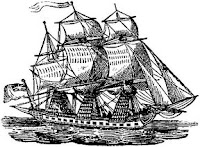Two Captains and the “disagreeable necessity” of Money
In the eighteenth-century British army, officers were expected to pay their predecessors when they were promoted into a new rank.
Thus, a captain might retire while receiving £750 from an ambitious lieutenant, who in turn would receive £300 from an ensign, whose father would pay £200 to get him into the army in the first place.
Since the captain had paid his own predecessor, he thought receiving £750 was only fair. And this system promised officers some money for their retirement. Of course, it also limited the officers’ ranks to men with wealth—which that society saw as a Good Thing. No matter that some competent officers languished without promotions for years because they couldn’t scrape up the cash.
A similar system appears to have taken hold in the East India Company maritime service, even though the corporation didn’t like it. (Probably because it wasn’t receiving a cut of the money changing hands.)
At the British Library blog, curator Margaret Makepeace just highlighted the case of Capt. James Munro of the East India Company’s fleet. Munro had gone to sea in 1766 at the age of ten, serving under his uncle William Smith [yes, another one] on the Houghton. By 1778 he was second mate, and by 1782 he was sailing to China on the York.
Makepeace writes:
Did the two captains work this out and maintain friendly family relations? See Makepeace’s article here.
Thus, a captain might retire while receiving £750 from an ambitious lieutenant, who in turn would receive £300 from an ensign, whose father would pay £200 to get him into the army in the first place.
Since the captain had paid his own predecessor, he thought receiving £750 was only fair. And this system promised officers some money for their retirement. Of course, it also limited the officers’ ranks to men with wealth—which that society saw as a Good Thing. No matter that some competent officers languished without promotions for years because they couldn’t scrape up the cash.
A similar system appears to have taken hold in the East India Company maritime service, even though the corporation didn’t like it. (Probably because it wasn’t receiving a cut of the money changing hands.)
At the British Library blog, curator Margaret Makepeace just highlighted the case of Capt. James Munro of the East India Company’s fleet. Munro had gone to sea in 1766 at the age of ten, serving under his uncle William Smith [yes, another one] on the Houghton. By 1778 he was second mate, and by 1782 he was sailing to China on the York.
Makepeace writes:
In 1782 James Monro succeeded his uncle William Smith as captain of the Houghton, making four voyages to China and India before resigning and passing the command to Robert Hudson in 1792. Captains were appointed by the ship owners and approved by the East India Company . . .I should note that 1,000 guineas was 5% more than £1,000—though still far less than half the difference between what Capt. Munro had paid his uncle Capt. Smith ten years before and what he had received from his successor.
In April 1792, William Smith wrote to his nephew, addressing him as ‘Dear Jim’. Smith understood that Monro had sold the command of the Houghton for 8,000 guineas, having paid him £4,000 for it. Although Monro had not promised him anything, Smith thought he should receive half the profit. Smith claimed that he could have sold his command at a far higher price, perhaps as much as £7,000, but he had his nephew’s interest too much at heart to consider such offers. He regretted the ‘disagreeable necessity’ of speaking his mind.
James Monro’s reply began ‘My dear Sir’. He felt that he was being put in a very unpleasant position, and put forward his side as he would to someone not related.
Monro was away on board the York when it was decided that he should succeed as commander of the new Houghton which was being built to replace Smith’s ship. On his return to England he was told to pay Smith £4,000. He had no idea that any future demand would be made on him until a chance conversation with his uncle some time later.
Both the East India Company and the owners had been trying to lessen the price given for ships, or to prevent totally the sale of commands. If they had succeeded, would Smith have refunded part of his £4,000? Smith had not paid for his own command but had received interest on Monro’s £4,000 for ten years.
Monro had always thought to offer his uncle £1,000 when he sold the command. He would cheerfully give him 1,000 guineas and nothing more need be said.
Did the two captains work this out and maintain friendly family relations? See Makepeace’s article here.


No comments:
Post a Comment